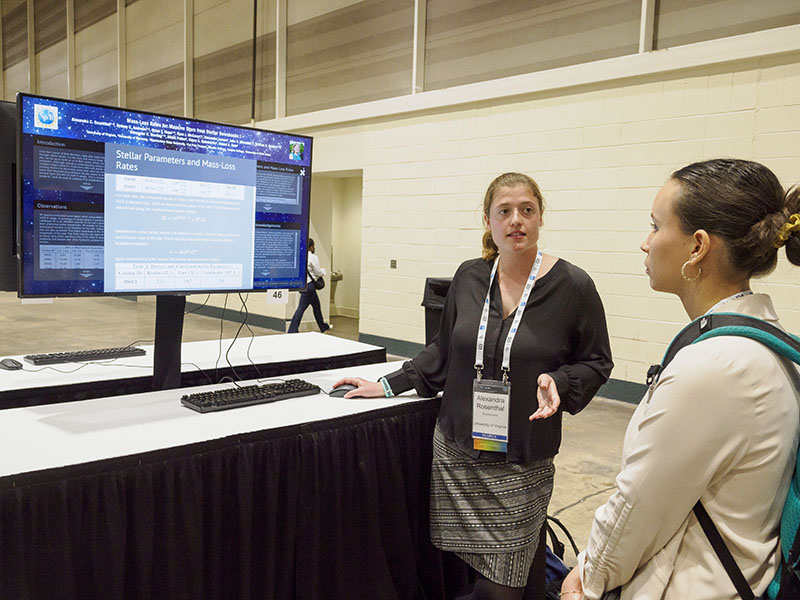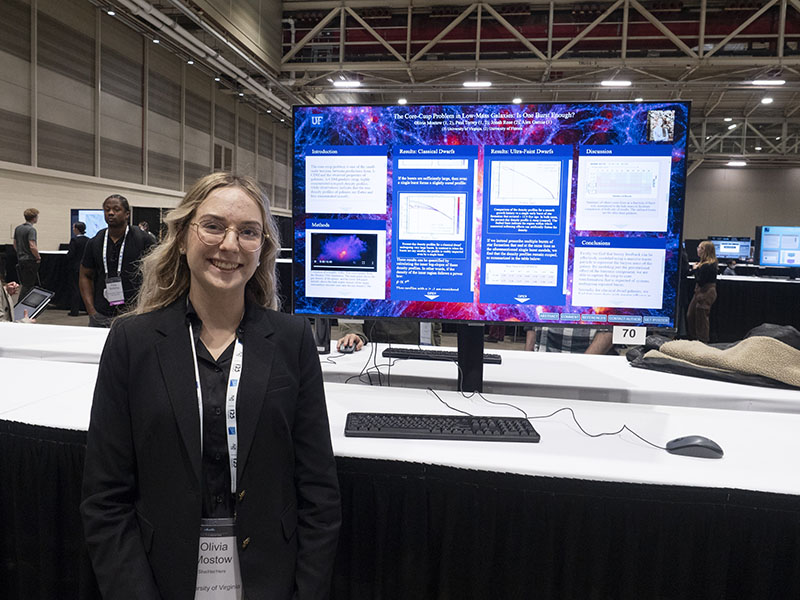Astronomical Achievement

More than a thousand scientists gather every year at the American Astronomical Society’s Winter Meeting, the world’s largest annual gathering of astronomers. For three undergraduate astronomy majors from the University of Virginia, this January’s AAS meeting in New Orleans turned out to be their shared moment in the sun.
Fourth-year students Alex Rosenthal and Becky Williams and third-year Olivia Mostow all left the weeklong conference with a Chambliss Astronomy Achievement Award, which honors examples of exemplary student research presented at the AAS meetings. The three Chambliss Awards earned by the UVA students is an unprecedented achievement for the College and Graduate School of Arts & Sciences’ Department of Astronomy.
Only one other school (Smith College) claimed as many as two medals.
"It's truly remarkable to witness our undergraduates' research gaining national recognition. The competition for the Chambliss Award is exceptionally tough, and having three students acknowledged from the same institution is exceedingly rare,” said L. Ilsedore Cleeves, an assistant professor of astronomy at UVA with a joint appointment in the Department of Chemistry.
Cleeves and other members of the Department of Astronomy’s faculty serve as valuable mentors to UVA undergraduate students aspiring to research careers in astronomy and related fields. Williams, for example, has worked with Cleeves’s research group the last two years, contributing to research on protoplanetary disks, the materials from which planets, comets and other solar system bodies eventually form. Last year, that work led to her publishing a paper, with Cleeves as one of her co-authors, in The Astrophysical Journal.

Those research experiences, as well as summer research opportunities at other institutions in the United States and abroad play an important role in boosting their competitiveness for openings in the top graduate programs.
“UVA Astronomy prioritizes connecting our undergraduates with cutting-edge research opportunities, both within the department and across the globe. These connections, combined with having a good educational foundation and developing the skills to communicate science well, are all part of what is recognized with the Chambliss Award. We are so proud of Becky, Alex and Olivia.”
For Rosenthal and Williams, preparing and rehearsing poster presentations of their astrophysical research projects coincided with deadlines for graduate school applications. The month heading into the AAS winter meeting was a blur.
“I had never given a poster presentation before, so I just had the mentality that whatever the outcome, I was really happy with my presentation. It was a pleasant surprise, to say the least, when they announced my name,” said Rosenthal, whose AAS presentation was based on a research program on the mass-loss rates for massive stars that she began last summer in Wyoming.
“I credit so much of who I am as a person to the opportunities that I’ve had because of UVA and because of the mentorship I’ve received at UVA from both students and professors,” added Rosenthal, who also has conducted research programs in Arizona over the course of her undergraduate career. “It's the reason why I was able to start research as early as I did. My advisors at UVA made it possible by being so accommodating and helpful.
Williams, who grew up in Yorktown, Virginia, spent last summer at Northern Arizona University completing a National Science Foundation research experience for undergraduates. Her Chambliss-winning presentation was titled “Investigating the Sulfur Mystery in Protoplanetary Disks Through Chemical Modeling”.
“I've been able to figure out what I want to focus on in grad school through these research opportunities,” Williams said. “Getting to attend these conferences, meeting other potential advisors and just networking, it’s been really important for learning about grad programs and connecting with researchers at different stages of their careers. It’s certainly been great to link up with someone like Ilse [Cleeves] who is a very well-respected expert in her field. She’s been an excellent mentor.

Mostow still has another year of undergraduate study at UVA to complete her bachelor’s degree in astrophysics as well as a bachelor’s degree in statistics.
“I’ve learned through these research opportunities how important it is to continue to put yourself out there,” said Mostow, a native of Ashburn, Virginia. “Especially in a competitive field like astrophysics, it can be easy to think that you don't have the right qualifications for something. But I’ve found that our professors are really willing to teach you what you need to know to succeed and advance in this field. Part of their job is to train the next generation of scientists, and every professor I have ever reached out to here at UVA has been eager to take on new students.”
Her faculty advisor, Asst. Prof. Paul Torrey, said he was not surprised that Mostow won a Chambliss medal for her poster presentation, “The Core-Cusp Problem in Low-Mass Galaxies: Is One Burst Enough?” The presentation was based on research she began last summer at the University of Florida.
“The work she has done has important implications in our efforts to probe the nature of Dark Matter, and she’s able to communicate her findings clearly and effectively,” said Torrey, a computational astrophysicist. “This is a sign of a very healthy undergraduate research program. Having this concentration of Chambliss awards doesn’t happen by accident. It starts with having excellent undergraduate students who are academically prepared, and then requires cutting-edge research programs within which they can engage.”









